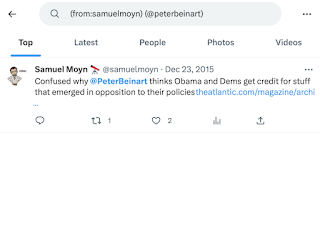

---
Moyn, "perhaps Arendt... wasn’t Zionist enough"
For this reason, the great use of reading Arendt alongside Cold War liberals in the age of decolonization is to consider the geographical morality they shared. They offered Cold War libertarianism for the transatlantic “West,” an emancipatory statism (with violence if necessary) in their Zionist politics, and a caustic skepticism about the fate of freedom in either form elsewhere, based on an implicitly hierarchical set of assumptions about the world’s peoples. If this is right, their establishment of that special category for Jews in the Middle East is compelling and remarkable, for its very existence—as the sole place in their thought where earlier forms of liberalism with their activism and statism were allowed to survive— represents a fundamental challenge to their call for limits in developed countries and anxieties about meaningless violence in developing ones. To the extent that Zionism allowed a last remnant of the earlier philosophy of liberal emancipation they all liquidated, perhaps Arendt, like the Cold War liberals, wasn’t Zionist enough.
Yerachmiel Kahanovich
E: What is Operation Broom and what was its objective?
YK: We cleared all the villages…
E: What do you mean?
YK: We cleared one village after another and expelled – expelled them, they fled to the Sea of Galilee and from there to the Galilee.
E: But how? How?
YK: You mean by shooting?
E: How do you mean?
YK: We shot, we threw a grenade here and there. Just listen – there's one thing you have to understand: at first, once they heard shots they took off with the intention of returning later.
E: But, wait a sec, that was before May 15, that was before the Arab armies came.
Operation Broom, Operation Broom then. How does it happen? Do you receive any information? Is it an organized campaign?
YK: Yeah, sure.
E: Tell me.
YK: It was. Who was it? Yigal Allon himself planned it. We moved from one place to the next.
E: What places? Can you tell me?
YK: We passed, we passed by Tiberias and moved from one village to the other, from one to the next.
E: So you had orders to expel and clean up the villages?
YK: And then go home.
E: But you did see how they ran away?
YK: We saw them, what do you think? I fired at them with that – with the Browning – on the boats.
E: They fled on boats?
YK: Yes.
E: On the Sea of Galilee?
YK: Yes. On the other side they had more [villages], except [Kibbutz] Ein Gev [which was the only Jewish settlement on the east bank].
E: And who were the people who fled?
YK: Village people, they were fishermen, among other things. Then it was Lod.
E: Wait a minute. We'll get to that.
YK: Ramle. We entered the houses only in one place, in Balad al-Sheikh, near Yagur. There it was really, murderous and all that. And he said, you go there with axes.
E: Who did?
YK: Only one man could – Yigal Allon. And I assume there was no misunderstanding between him and Ben Gurion, no. "So go there with axes, let them get lost, leave no trace. As much as you can, don't use any bullets, so that they won't hear it at the [British] police [station in Yagur] and, so that they won't send them reinforcements.
E: So what did you do?
YK: We smashed the door and throw a grenade…
E: In Balad al-Sheikh?
YK: And indeed it never rose again, it's gone.
Not less dangerous and quite in accord with this general trend was the sole new piece of historical philosophy which the Zionists contributed out of their own new experiences; "A nation is a group of people ... held together by a common enemy" (Herzl)-an absurd doctrine containing only this bit of truth: that many Zionists had, indeed, been convinced they were Jews by the enemies of the Jewish people. Thereupon these Zionists concluded that without antisemitism the Jewish people would not have survived in the countries of the Diaspora; and hence they were opposed to any attempt to liquidate antisemitism on a large scale. On the contrary, they declared that our foes, the antisemites, "will be our most reliable friends, the antisemitic countries our allies" (Herzl). The result could only be, of course, an utter confusion in which nobody could distinguish between friend and foe, in which the foe became the friend and the friend the hidden, and therefore all the more dangerous, enemy."We were the first fascists" Marcus Garvey.
We are living in a time of exploding nationalisms. The blacks in America are the first to abjure the idea of assimilation, to realize the inherent lie in the concept of melting pot. Through black nationalism has developed a new black pride and hence the ticket to liberation
Today’s young American Jew is a good bit slower. He desperately wants assimilation: Jewishness embarrasses him. He finds the idea of Jewish nationalism, Israel not withstanding, laughable. The leftist Jewish student is today’s Uncle Tom. He scrapes along, demonstrating for a John Hatchett, ashamed of his identity, and obsessed with it. He cannot accept the fact that he is seen as a Jew, that his destiny is that of the Jews, and that his only effectiveness is as a Jew. But he wants to be an “American,” a leftist American, talking liberation and aspiring WASP. He is a ludicrous figure.

No comments:
Post a Comment
Comment moderation is enabled.